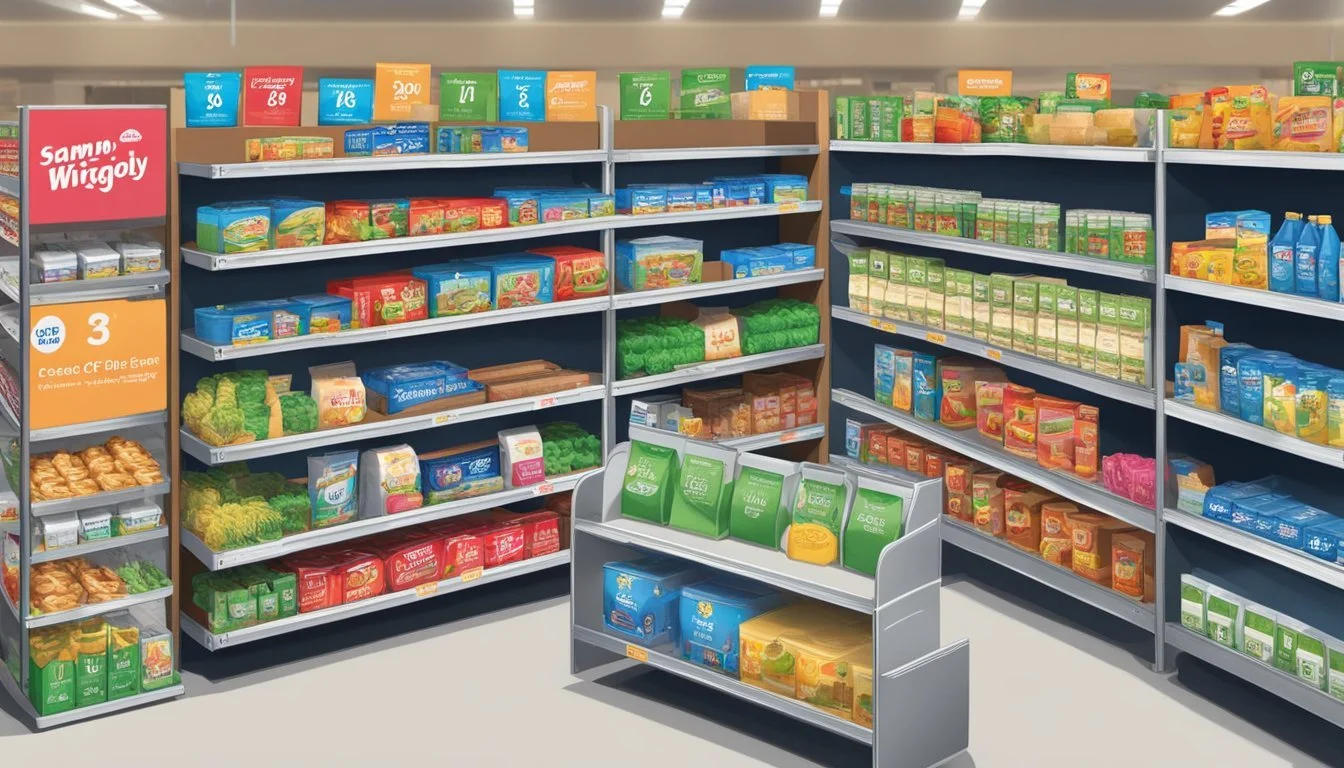Is Sam's Club Cheaper Than Piggly Wiggly?
Analyzing Grocery Savings
Part of Our Grocery Store Guide with Details on Sam's Club Prices and Piggly Wiggly Prices
When comparing the prices of groceries and goods, consumers often consider warehouse clubs and local grocery chains. Sam's Club, a prominent warehouse club offering bulk items and exclusive member prices, is frequently discussed alongside Piggly Wiggly, a regional grocery store chain known for its hometown feel and general accessibility. The question of whether Sam's Club is a cheaper option than Piggly Wiggly relates not just to the sticker price but also to shopping habits, membership costs, and the value of buying in bulk versus standard retail sizes.
Price comparison can be complex due to the nature of Sam's Club requiring a paid membership to take advantage of its potential savings. While initial membership costs may seem like a barrier, the unit price of items at Sam's Club often proves to be lower, particularly on bulk items. In contrast, Piggly Wiggly, with no entry fee and the convenience of local stores, can sometimes have higher priced items but offers weekly sales that can mitigate this difference.
The decision on the cheaper option doesn't rest solely on the price tag; it encompasses the value derived from membership perks, quality of products, and shopping preferences. Sam's Club may offer savings for those willing to buy in larger quantities and make fewer trips, while Piggly Wiggly's pricing and promotions could benefit those looking for smaller quantities and immediate access without the commitment of a membership.
Understanding Wholesale Clubs and Grocery Stores
When exploring the cost-effectiveness of retail venues like Sam's Club and Piggly Wiggly, it's essential to understand the differing retail models of wholesale clubs and traditional grocery stores. Each offers a distinctive shopping experience influenced by factors such as membership requirements, pricing strategies, and product assortment.
Definition of Wholesale Clubs
Wholesale clubs, like Sam's Club, Costco, and BJ's, operate on a membership-based model that grants access to a wide array of bulk items at discounted rates. For example, Sam's Club, a division of Walmart, offers various products ranging from groceries to electronics, typically in larger quantities. Membership fees are a hallmark of these clubs, providing the revenue needed to maintain lower per-unit prices.
Characteristics of Grocery Stores
Grocery stores, including Kroger, Aldi, and Piggly Wiggly, cater to daily shopping needs with no membership required. They provide a range of grocery items, often focusing on smaller packaging suited for immediate consumption. Piggly Wiggly, as a conventional grocery store, might offer weekly sales, but it is not primarily structured around bulk sales model like wholesale clubs.
Comparing Business Models
The business models of wholesale clubs and grocery stores are distinguishable by their approach to sales volume, pricing, and customer service. Wholesale clubs, such as Costco and Sam's Club, offer lower prices on bulk items for customers willing to buy in larger quantities and pay an annual membership fee. Conversely, grocery stores like Piggly Wiggly and Kroger typically see customers purchasing more frequently but in smaller amounts, relying on regular deals and convenient locations to attract shoppers. Big box stores often encompass a wider variety of items compared to grocery stores, including electronics, furniture, and other non-grocery items.
Membership and Fees
When comparing the costs of shopping at Sam's Club versus Piggly Wiggly, it's important to consider the membership structure and fees at Sam's Club and how they can affect a shopper's budget and potential savings.
Benefits of Membership
Sam's Club offers its members a range of benefits geared towards saving money. Members can take advantage of bulk pricing, exclusive coupons, and free prescriptions in some cases. A distinguishing feature of Sam's Club is the ability to earn cash back with a Plus membership, which provides additional savings over time.
Cost Analysis of Memberships
Sam's Club's annual membership fee varies based on the membership tier:
Club Membership: Typically around $50 per year.
Plus Membership: Normally close to $110 per year, offering extra benefits such as cash back on purchases.
To understand if these fees are justifiable, one needs to compare the volume of purchases and savings obtained through membership benefits against the annual fee. If an individual spends significantly at Sam's Club or values the extra benefits, the Plus membership can be more cost-effective, particularly with the 2% cash back on purchases up to $500 annually.
Membership Access and Restrictions
Sam's Club membership grants access to their warehouse stores, including exclusive prices on products and services. However, there are restrictions:
Non-members can shop online or in-store with a 10% service fee.
Member guests may enter but can't purchase without the accompanying member.
Memberships are non-transferable and only allow the cardholder (and additional household or business members under the same membership) to perform shopping transactions. A comparison with Piggly Wiggly reveals no membership requirements there, offering unrestricted access but lacking Sam's Club's membership-exclusive benefits.
Product Pricing and Deals
When comparing Sam’s Club and Piggly Wiggly, the focus often shifts toward price, as customers tend to look for savings on everyday items. This section dissects various aspects of pricing and deals between the two retailers.
Grocery and Staple Items
Piggly Wiggly may offer competitive pricing on specific staple items such as milk, eggs, and meat, potentially edging out Sam's Club on select products. They often highlight deals on these categories, positioning themselves as a budget-friendly option for the daily shopper.
Bulk Purchases and Savings
Sam's Club typically provides substantial savings on bulk purchases. Customers who buy large quantities of toilet paper, diapers, or laundry detergent can expect lower prices per unit. This can lead to notable cost efficiencies over time, leveraging Walmart's expansive supply chain.
Paper towels - lower per-roll cost in bulk
Diapers - sizable savings on larger packs
Everyday Low Prices and Sales Events
Sam’s Club prides itself on everyday low prices due to their large buying power. They also host periodic sales events where members can purchase goods at a reduced cost, including meat and dairy products. These events provide an opportunity for significant price drops even beyond their standard low prices.
Coupon Use and Promotional Deals
Piggly Wiggly accepts coupons and often runs promotional deals that can further reduce the cost of groceries. These discounts can turn out to be more immediate compared to Sam's Club, where the focus is on consistent low pricing rather than fluctuating deals.
Coupons - accepted for additional savings
Weekly deals - frequently updated offers on different items
Quality and Selection of Products
When considering whether Sam's Club or Piggly Wiggly offers the better shopping experience, it is essential to assess their product quality and selection across various categories.
Freshness of Produce and Meats
At Sam's Club, customers can find a wide assortment of produce ranging from bananas to specialty fruits, often in larger quantities, ideal for stocking up. Their meats, such as chicken breast and ground beef, are sold in bulk and are known to be fresh and of high quality. Piggly Wiggly, while smaller in scale, frequently receives praise for its refrigerated cases of fresh produce and a deli that provides an array of meats, including the popular ham, catering to smaller household needs.
Diversity in Brand and Product Types
Shoppers at Sam's Club enjoy the benefit of accessing a broad range of brands, including their exclusive Kirkland label which covers everything from Greek yogurt to olive oil. Piggly Wiggly offers a more selected diversity but highlights quality with both well-known and unique brands, ensuring customers have a variety of grocery items to choose from, including niche snacks and sour cream.
Availability of Non-Grocery Items
Sam's Club's inventory extends beyond groceries, offering an expansive selection of electronics, toiletries, and cleaning supplies. This makes it a one-stop shop for bulk purchases. Piggly Wiggly focuses more on the grocery aspect and provides a limited yet specialized range of non-grocery items that cater to the immediate needs of their clientele.
Exclusive Products and Brands
Exclusive offerings at Sam's Club include its Kirkland brand products, which are lauded for their quality at a lower price point. In contrast, Piggly Wiggly, while not typically known for exclusive brands, boasts a selection of products that are tailored to the preferences of their local community, often featuring items that are otherwise hard to find.
Shopping Experience
When comparing Sam's Club with Piggly Wiggly, one must consider the distinct shopping experiences they offer. Each caters to different shopping needs and styles, from the convenience of navigating the store layout to the efficiency of checkout procedures.
Store Layout and Navigation
Sam's Club operates as a membership-only warehouse club, where the layout is designed to accommodate large volumes of merchandise, typically sold in bulk. Store layout is strategic, encouraging customers to consider bulk purchases and often enticing them with impulse buy items along the way. The aisles are wide, suited for handling the heavy traffic of shoppers and large carts. Piggly Wiggly, on the other hand, follows a more traditional grocery store layout, focusing on providing a more localized and intimate shopping experience where customers can quickly find items from their shopping list or for their meal plan without the potential overwhelm of a big-box store's vast inventory.
Customer Service and Support
In terms of customer service, the staff at Sam's Club are trained to manage high volume sales and may provide assistance with finding bulk items or processing membership inquiries. Piggly Wiggly prides itself on fostering a hometown grocery feel, where employees may offer a more personalized service, given the smaller store size. Management at Piggly Wiggly stores can often be more accessible compared to their big-box counterparts.
Checkout Procedures and Efficiencies
Checkout efficiency is key to a positive shopping experience. Sam's Club utilizes self-checkout lanes and integrates technology for member's quick and convenient exits, catering to those with time constraints. Piggly Wiggly stores vary by location, but typically they also have streamlined checkout procedures, though they may not always match the technological integrations of their competitors. Each aims to minimize wait time, yet the scale of operation at Sam's Club allows them to manage high traffic volumes, sometimes resulting in faster overall efficiency during peak hours.
Strategies for Maximizing Value
To realize the greatest savings at Sam's Club and Piggly Wiggly, shoppers should employ deliberate strategies. Shopping lists, sales cycles, and store memberships can all play pivotal roles in enhancing value and sticking to a budget.
Creating an Effective Shopping List
A shopping list acts as a blueprint for savings. At Sam's Club, members benefit from bulk items which provide a lower unit cost, making it essential to list items that are not only needed but also have a longer shelf life to avoid waste. In contrast, Piggly Wiggly might have better pricing on day-to-day items, so it should be prioritized for more frequent, smaller purchases.
Sam's Club: Bulk items like rice, toilet paper, etc.
Piggly Wiggly: Day-to-day essentials like bread, fresh produce.
Planning for Sales and Seasonal Deals
Acquainting oneself with the sales and promotional cycles of both stores is crucial. Shoppers often find that Sam’s Club offers discounts on various items and additional cash back on purchases with their Plus membership. Conversely, Piggly Wiggly often runs weekly specials and seasonal deals that can be leveraged without any membership fee.
Sam's Club: Look for monthly promotions, instant savings.
Piggly Wiggly: Check weekly flyers for current deals.
Leveraging Memberships Across Stores
Memberships are an investment toward savings. The annual fee for Sam's Club should be weighed against the potential for savings and cash back on purchases, especially for bulk buys. Piggly Wiggly may not offer a comparable membership program, but shoppers can still take advantage of any loyalty or discount programs available.
Sam's Club: Membership costs, potential savings, cash back.
Piggly Wiggly: Loyalty programs, no membership fee.
By meticulously crafting grocery lists, timing purchases with sales, and utilizing membership perks, shoppers at Sam's Club and Piggly Wiggly can maximize their value—turning every shopping trip into an opportunity to save money.
Impact of Economic Factors
Economic conditions greatly influence consumer choices between retailers like Sam's Club and Piggly Wiggly, especially concerning grocery pricing and the value of bulk buying. Membership decisions such as renewals also hinge on these financial factors, as shoppers evaluate the benefits received for the associated costs.
Inflation and Grocery Pricing
Inflation affects the price of groceries, influencing how consumers budget for food. Sam's Club, known for bulk purchases, may offer a cost advantage on multiple-unit items. On the other hand, Piggly Wiggly might be the cheaper option for consumers looking to buy smaller quantities, especially in a localized market where competitive pricing is crucial. For example:
A can of canned goods: Sam's Club may sell it in bulk (e.g., 10 for $10), whereas Piggly Wiggly could offer them individually at a slightly higher per-unit price but at a lower upfront cost (e.g., $1.10 each).
Bulk Buying in a Shifting Economy
The economic shift encourages consumers to consider the value of bulk buying at stores like Sam's Club. For items with a long shelf life or non-perishable goods like canned food, bulk buying can lead to significant savings. Here's how Sam's Club's strategy might compare:
Bulk items: Typically lower per-unit cost at Sam's Club.
Cheap food: Sam's Club's larger packs may result in lower overall expenses.
Costco, a competitor, also offers bulk items but includes a different selection, which may impact a buyer's decision based on price and product availability.
Renewal Decisions for Annual Memberships
Consumers must weigh the annual fee against potential savings, which is particularly significant amid economic fluctuations. Sam's Club members might evaluate the Plus Membership, which offers added benefits such as free shipping or cashback, against the annual fee to decide if the higher upfront cost justifies the returns. In contrast, Piggly Wiggly doesn't require a membership fee, attracting budget-conscious shoppers who may prefer to avoid additional expenses. A simple comparison:
Sam's Club Annual Membership Fee: $45 for standard, up to $100 for Plus.
Piggly Wiggly: No membership fee, immediate access to store deals.
Conclusion
When assessing the price competitiveness between Sam's Club and Piggly Wiggly, consumers look for value that extends beyond mere pricing. Sam's Club traditionally offers bulk purchases which may lead to cost savings in the long run. Members benefit from exclusive deals and larger product sizes, which can translate to fewer shopping trips and reduced per-unit costs.
Piggly Wiggly, on the other hand, attracts customers with its localized approach and competitive pricing in certain regions. For shoppers who do not buy in bulk or are looking for convenience in smaller neighborhoods, Piggly Wiggly could provide better value for money.
The term "cheapest grocery store" can be subjective and varies based on individual shopper habits. To save money, a consumer must consider factors such as:
Volume of products needed
Frequency of store promotions
Accessibility of the store
Membership fees (if applicable)
Analysis indicates that while Sam's Club may offer lower prices on certain items, especially when bought in bulk, Piggly Wiggly can be a practical alternative for customers purchasing smaller quantities who prioritize immediate savings.
In conclusion, the decision between Sam's Club and Piggly Wiggly rests on the consumer's shopping patterns and needs. Those seeking larger quantities at discounted rates might lean towards Sam's Club, while those who prefer to shop in smaller amounts could find Piggly Wiggly to be the more economical choice. It's always advisable for customers to compare prices and consider their shopping habits before choosing their preferred grocery store.









